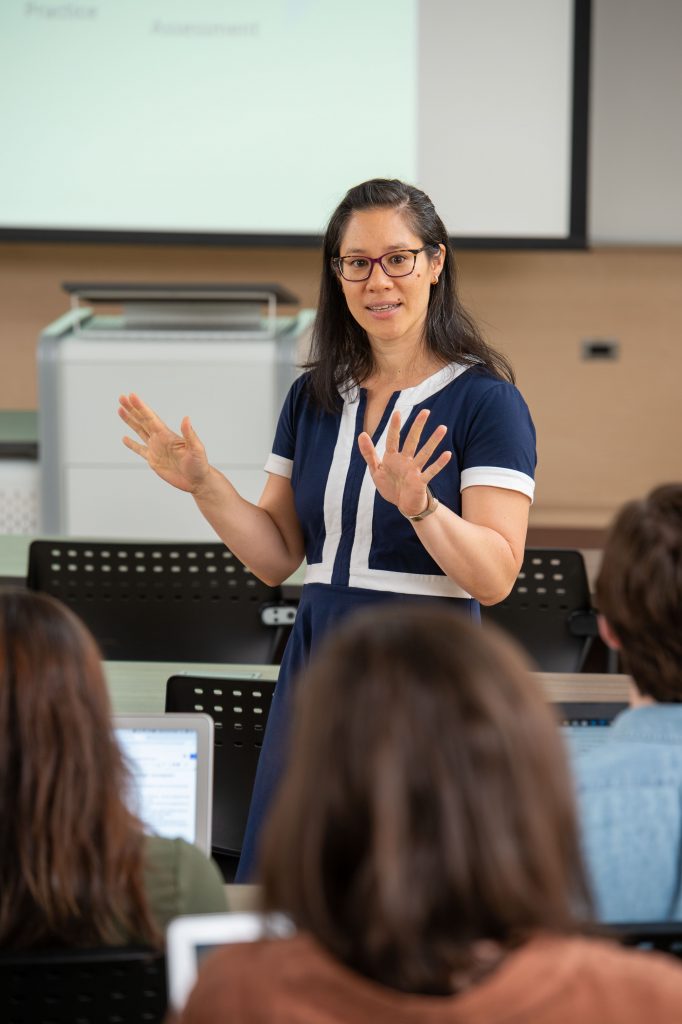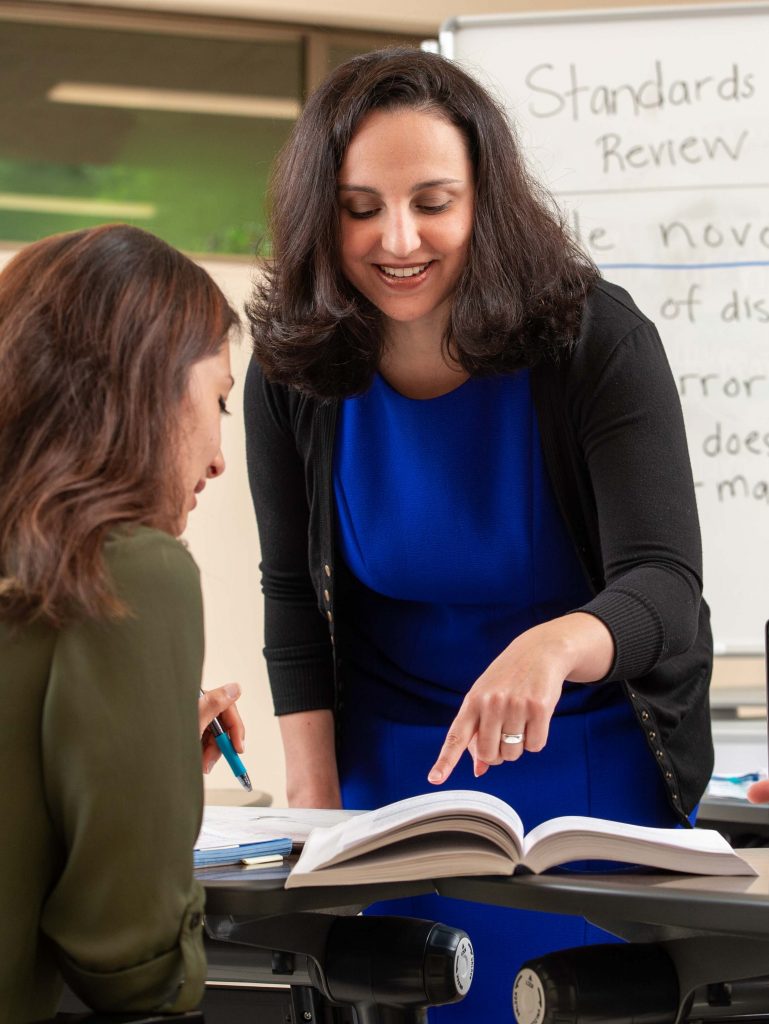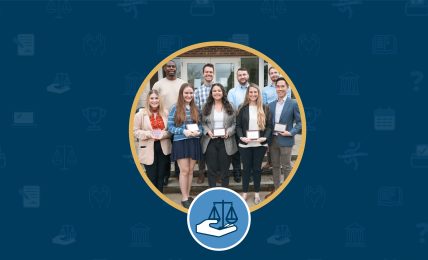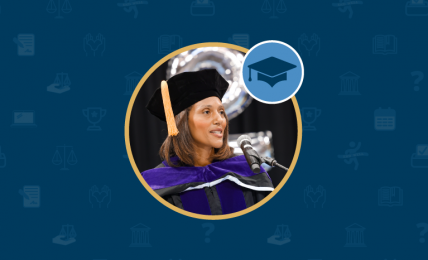Helping law students navigate and improve their legal education

There are many things that permeate society like hierarchy and structural inequality. Law schools aren’t immune. In Professors Alexa Chew and Rachel Gurvich’s upcoming essay in the Nebraska Law Review Vol. 100, they tackle the ways in which students can feel inequities affecting their legal education even though those inequities aren’t clearly seen to begin with.
“Saying the Quiet Parts Out Loud: Teaching Students How Law School Works” is based on an asynchronous unit taught during the spring 2021 semester called “How Law School Works”. The unit allowed students to complete the series on their own time and included podcasts, reflection questions and an optional faculty-led Zoom discussion session. Professors Chew and Gurvich answered a few questions about the article and their take-aways from incorporating a unit like this into the 1L curriculum.
Please explain the title of the article and its significance.
The first part of the title, “Saying the quiet parts out loud,” is the metaphor for what we were trying to do with this unit. Many of the things that law students–and law professors!–think about and spend their emotional energy on in the law school environment remain unsaid, and students might experience them in shame or secrecy. We wanted to acknowledge those experiences, bring them out into the open, and practice talking about them as a community. To borrow a metaphor from researcher Brene Brown, we want to drop some empathy into the petri dish of law school shame.
The second part of the title, “teaching students how law school works,” comes from the name of the asynchronous unit itself: How Law School Works. In our legal research and writing course, we have other asynchronous units that cover “traditional” 1L subject matter: How Federal Citation Works, How Trial Courts Work, and How Appellate Courts Work. We wanted to present “how law school works” on the same footing as these other more traditional legal writing and research coursework. How law school works includes the stuff that is quiet and unsaid but everybody wants and needs to know.

Why is making inequities in law school visible for 1Ls so important to how they navigate their legal education?
Law school is a lot of work for the brain, the body, and the heart. Traditional legal education focuses on the brain and, as wellness sweeps the nation, law schools are thinking more about the body. But the heart is what will break from inequities–feeling them, not being able to name them, not knowing how to fix them, and being isolated by them in this otherwise very collective experience of the 1L year of law school.
To reduce isolation and increase belonging, we need to know how other people experience the same institution (law school) and connect their lived experiences with our own. Students also deserve to learn “how things work” at the beginning of law school so they can better navigate the system and build community during law school, not years later.
Briefly describe how you incorporated the three podcasts into your series of asynchronous lessons.
We incorporated the podcasts into a lesson on our course learning management system, Sakai. We distributed the lesson before the semester even began, but because the unit wasn’t due until about mid-way through the semester, students were free to work at their own pace. The unit included 3 podcasts. We asked all students to listen to and reflect on the podcasts, hoping that the experience would give them a shared vocabulary with which to discuss important issues. After each podcast, students answered this reflection question: “Describe something you learned from this podcast, something that surprised you, or your response to something you heard.”
It was important to us that students be able to access this information on their own terms–perhaps even on a walk or while folding laundry–which is why we chose podcasts and not readings or videos. And we also wanted students to be able to share as much or as little as they wanted of their personal responses to what they had heard, which is why we kept the reflection questions open-ended and decided that only professors would have access to the responses. Finally, we held an optional discussion for interested students. Before that meeting, the professors read all of their students’ reflections and synthesized some common themes, which we shared with the students during the course of the session.
What surprised you about your students’ reactions? What didn’t surprise you?
We had no expectations so we had no surprises.
We appreciated how deeply some students chose to engage with the material. In both the reflection responses and the discussion group, some students shared very personal examples of times during law school when they had felt the inequalities we were learning about. Others confessed to how much they didn’t know or hadn’t appreciated–about the experiences of their disabled classmates, for example, or about the experiences of their women of color faculty.
What did you want to achieve with “How Law School Works” and do you think it was successful?
We wanted to create a space for students to learn about aspects of law school that aren’t normally discussed or even acknowledged in other parts of the law school experience. Things like forgoing disability accommodations because they are so difficult to get, the tensions between what law schools need from their faculty and what they pay for, and the ongoing debate about whether the bar exam is the best way to license new attorneys.
We think we succeeded in challenging some of the traditional norms of legal education and empowering law students to know what was going on at an institutional level so that they could direct their advocacy in appropriate directions.
What is your hope for the future of the course at Carolina Law and do you hope other law schools will adopt this opportunity for candor in the legal education environment?
The idea of the unit is really to acknowledge things that are bubbling under the surface and affecting students as they move through their legal education, and to signal that their professors see these things too and are open to conversations about them. That goal can be achieved in a lot of different ways, but one of them is for professors at Carolina and elsewhere to adopt a similar unit in their own courses. Because the podcasts can easily be swapped out, the unit can be adapted to different settings and communities. It’s also a good opportunity to build trust across the community and professional skills (empathy, active listening, engaging in difficult conversations) that aren’t always valued in other parts of the law school.
And we hope this experience will stay with law students as they graduate and enter the legal profession. That they will have experience noticing inequities in professional environments and saying the quiet parts out loud there, too.
As for candor: we think it’s important for law faculty and administrators to be transparent and, even if necessary, vulnerable with their students. Students deserve it and we think it will make for better law school environments.



